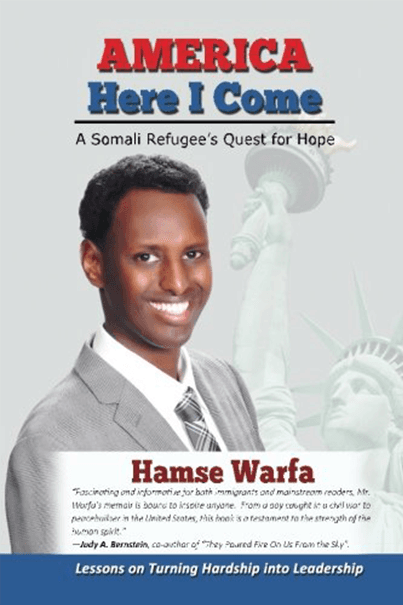
Author
A Somali Refugee's Quest for Hope
The book is candid about the kind of challenges that new immigrants face seeking education and integration in the U.S. The cultural shocks that Hamse faces in the new land of opportunity are as funny as they are thought-provoking.

What's inside the book
Read Free Chapter
Introduction
The hustle and bustle of modern-day America can be many. Like almost every other professional, I have to wake up be- fore dawn and head to my home office to plan my day. I check out my diary to see who I am supposed to meet, at what time and where. I check out too what the deliverables will be for me, and once again confirm that the objectives I set before going to sleep last night will be achievable before I call it a day later in the evening.
Satisfied that everything is on a good course, it's now time to step out of the office room and start helping two of my children: Samia, six-years-old, and Subeir, five-years-old, prepare for school. Sabrina, our one year-old lastborn, is in the meantime left at home with her mother, Ikran Abdi, who will later in the day be heading to class.
Ikran hopes to become a nurse in the not-so-distant future. This is a dream that I am doing my best to help her achieve-though I know I can never repay her for the sacrifices she has made for our kids and me. She is my best friend, my love, and the mother to my lovely kids.
At work, I know I will find the correspondence in my in-tray over- flowing. Not that I am lazy--I have spent this entire week out of of- fice in meetings. My day job is with Margaret A. Cargill Philanthro- pies (MACP), which serves as the umbrella over three grant-making organizations founded by the late Margaret A. Cargill, all with a common mission: To provide meaningful assistance and support to society, the arts and the environment. The philanthropies provide funding to organizations engaged in nonprofit work, both domestic and global.
In the evening I will be at the Institute for Horn of Africa Studies and Affairs (IHASA), a think tank that I helped establish in 2008 in a quest for lasting peace and development in the region. It is at this institute that I spend considerable amounts of time outside of my work with MACP. At IHASA, we are currently organizing for the annual academic conference. It is during such occasions that we bring together eminent scholars and community members to discuss socio-economic and political issues, and also train youth on leadership and conflict analysis in preparation for upcoming leadership roles. While the institute's members are predominantly Somali, we also have Kenyans, Ethiopians, and Sudanese, among other nationals whose countries have of late suffered armed con- flicts.









